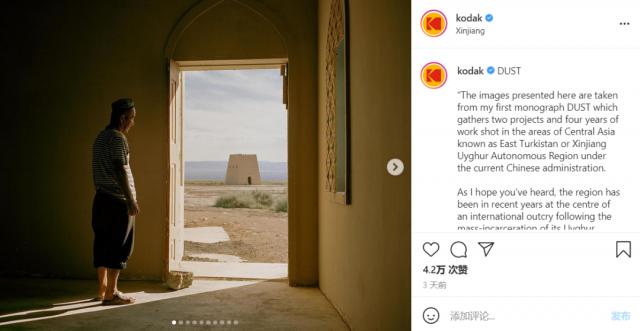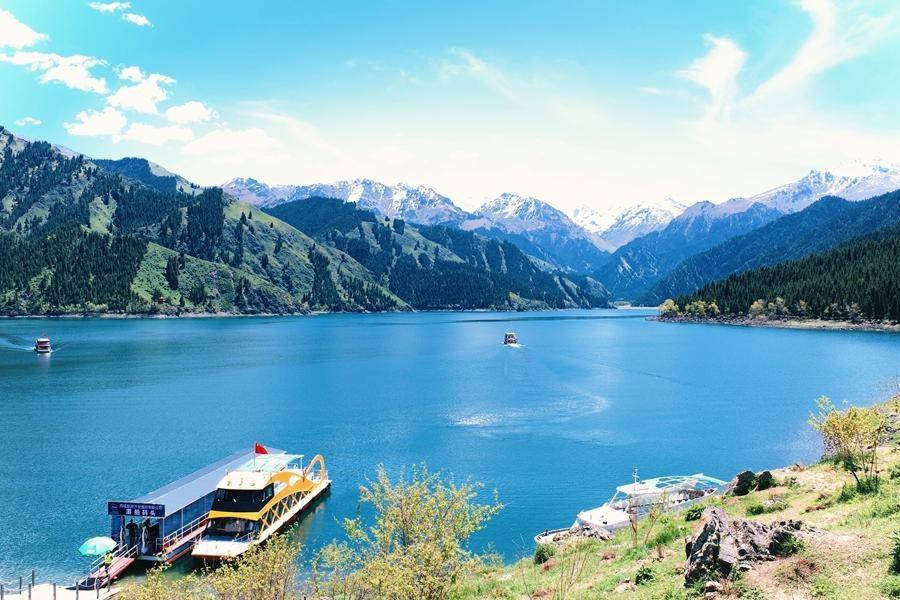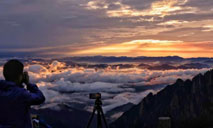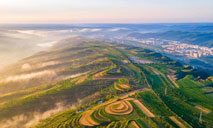Chinese netizens criticize Kodak for posting photos of Xinjiang while describing the place as under 'acute repression'

(Screenshot/ Official Instagram account of Kodak)
Photography giant company Kodak was criticized by Chinese netizens after releasing a series of pictures of landscapes taken in Northwest China's Xinjiang Uygur Autonomous Region on Thursday. The images were published with the post "mass arbitrary detention system being set up in the region," adding that the work "is a testimony to its [Xinjiang's] abrupt descent into an Orwellian dystopia."
It's not uncommon for the West to hype about the Xinjiang issue under the instigation of anti-China forces headed by the United States. However, judging from the set of photos and their background information, there are many "new things" worthy of the attention of Chinese government and netizens.
As former leader in the photography industry, Kodak often reposts the works of photographers from different countries on Instagram and invites them to tell the story behind the image.
The images in question were shot by French photographer Patrick Wack in Xinjiang. Distant from the approach used by foreign medialike BBC, Wack's photos of Xinjiang include the magnificent mountains and rivers in the region and scenes of the peaceful life of the local people.
However, it is precisely because these photos portray normal scenes of daily life, the wording of the post, written by Wack and posted by Kodak, seem even more strange and out of place.
By only looking at the photos, no one can associate the beautiful scenes with "China's persecution of Xinjiang people." In the comments of these images, most of the netizens are praising the beautiful scenes in Xinjiang.
"Very beautiful images," said one netizen on Instagram. "I'm in awe. Such beautiful work," said another.
This makes people curious about the description made by Wack. Why is he showing an "abrupt descent into an Orwellian dystopia?" Is this Xinjiang or did the photographer himself made such conclusion?
Hyping Xinjiang issue to make more money
The Global Times found that Wack is a relatively well-known figure in the photography industry. He is currently based in Shanghai and has lived in China for a long time. Judging from his previous public statements, he could not be counted as a "stubborn anti-China element" and rarely participated in political activities.
So, why did he try to relate his photos with the Xinjiang issue? "Make money" from photos can be a reasonable guess.
Wack's photos published in a collection called "Dust" hit the shelves recently, and all the photos retweeted by Kodak's official account are from the book.
As a photographer with a small reputation in the industry but not well-known among ordinary netizens, Wack's works generally only get a few hundred likes on Instagram. However, after relating the post with the Xinjiang issue and the repost by Kodak, the photos suddenly received tens of thousands of likes.
Following the mainstream context of the Western media, he described Xinjiang as a place under "acute repression" and gave his works the mystery of expedition, which greatly satisfied the curiosity of Western netizens with prejudice against China.
However, the photos haven't made any waves in Chinese social platforms three days after their publication, as Kodak is not very active in the Chinese market and is not popular with Chinese netizens.
The Global Times reporter observed that in the past, those who hyped up Xinjiang and other issues were either politicians from the United States and other Western countries or enterprises and institutions following the guide of Western countries.
But in this issue, there are plenty in the grey zone like Wack who, while not "stubborn anti-China people," are eager to bask in the fame and fortune that anti-China matters can bring. As these people are less political and more professional in their field, how they spin their story is more attractive to the general public.
In addition, if the Chinese government strikes back at these people, it is easy to fall into arguments about "the big bullying the small" and "the government targeting civilians". This makes Western politicians particularly happy and will try to push them to the front lines and create problems for China.
In the face of this anti-China slander, China should know how to deal with it, how to fight back public opinion, and how to guide and transform them. These are the challenges the country may often encounter in the future.
For Kodak, it is better for the company to realize that there are numerous photographers and vloggers in China who use Kodak products to create works that reflect life in Xinjiang, and who know more about Xinjiang than Wack. If Kodak really cares about Xinjiang, why it is not promoting works by Chinese photographers to netizens worldwide?
Photos
Related Stories
- Xinjiang sets great store by preservation of cultural treasures
- Interview: China's white paper on Xinjiang important for knowing real Xinjiang - Jordanian expert
- Foreign officials, experts hail Xinjiang's progress in human rights
- China's Xinjiang witnesses brisk growth in economy and social affairs
- Xinjiang: Our Stories Be Told Part 5 – Livelihood
Copyright © 2021 People's Daily Online. All Rights Reserved.










